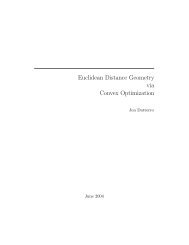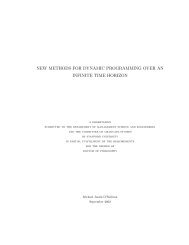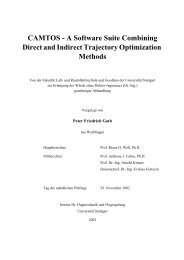Economic Models - Convex Optimization
Economic Models - Convex Optimization
Economic Models - Convex Optimization
You also want an ePaper? Increase the reach of your titles
YUMPU automatically turns print PDFs into web optimized ePapers that Google loves.
60 Dipak R. Basu and Alexis Lazaridis<br />
Cripps, F and WAH Godley (1976). A formal analysis of the Cambridge economic policy<br />
group Model. <strong>Economic</strong>a 43, August, 335–348.<br />
Cooley, TF and EC Prescott (1973). An adaptive regression model. International <strong>Economic</strong><br />
Review l4, June, 248–256.<br />
Das, M and R Cristi (1990). Robustness of an adaptive pole placement algorithm<br />
in the presence of bounded disturbances and slow time variation of parameters.<br />
IEEE Transactions on Automatic Control 35(6), June, 762–802.<br />
Davis, HT (1941). The Analysis of <strong>Economic</strong> Time Series. Bloomington: Principia Press.<br />
De Castro, F (2006). Macroeconomic effects of fiscal policy in Spain. Applied <strong>Economic</strong>s<br />
38(8–10), May, 913–924.<br />
Farley, J, M Hinich and T McGuire (1975). Some comparison of tests for a shift in the slopes<br />
of a multivariate time series model. Journal of Econometrics 3, August, 297–318.<br />
Friedman, M and A Schwartz (1963). A monetary history of the United States, 1867–1960.<br />
Princeton: Princeton University Press.<br />
Folster, S and M Henrekson (2001). Growth effects of government expenditure and taxation<br />
in rich countries. European <strong>Economic</strong> Review 45(8), 1501–1520.<br />
Goldberger, AC, AL Nagar and HS Odeh (1961). The covariance matrices of reduced<br />
form coefficients and forecasts for a structural econometric model. Econometrica 29,<br />
556–573.<br />
Godley, W and M Lavoie (2002). Kaleckian models of growth in a coherent stock-flow<br />
monetary framework: A Kaldorian view. Journal of Post Keynesian <strong>Economic</strong>s 24(2),<br />
277–312.<br />
Godley, W and M Lavoie (2007). Fiscal policy in a stock-flow consistent (SFC) model.<br />
Journal of Post Keynesian <strong>Economic</strong>s 30(1), 79–100.<br />
Hamberger, MJ (1971). The lag in the effect of monetary policy:A survey of recent literature.<br />
Monthly Review-Federal Reserve Bank of New York, December, 289–297.<br />
Humphrey, TM (1981). Adam Smith and the monetary approach to the balance of payments.<br />
<strong>Economic</strong> Review, Federal Reserve Bank of Richmond 67.<br />
Humphrey, TM (1993). Money, Ranking and Inflation. Aldershot: Edward Elgar.<br />
Khan, MS (1976).A monetary model of balance of payments: The case ofVenezuela. Journal<br />
of Monetary <strong>Economic</strong>s 2, July, 311–332.<br />
Khan, MS and PJ Montiel (1989). Growth oriented adjustment programs. IMF Staff Papers<br />
36, June, 279–306.<br />
Khan, MS and PJ Montiel (1990), A marriage between fund and bank models. IMF Staff<br />
Papers 37, March, 187–191.<br />
Lazaridis, A (1980). Application of filtering methods in econometrics. International Journal<br />
of Systems Science 11(11), 1315–1325.<br />
Lucas, RE, Jr (1972). Expectation and the neutrality of money. Journal of <strong>Economic</strong> Theory<br />
4, April, 103–124.<br />
Meyer, T (1967). The lag in effect of monetary policy, some criticisms. Western <strong>Economic</strong><br />
Journal 5, September.<br />
Mayer, R (1972) Estimating coefficients that change over time. International <strong>Economic</strong><br />
Review 11, October.<br />
Muscatelli, VA and P Tirelli (2005). Analyzing the interaction of monetary and fiscal policy:<br />
does fiscal policy play a valuable role in stabilization. CESIFO <strong>Economic</strong> Studies 51(4),<br />
1–17.<br />
Nicolao, G (1992). On the time-varying Riccati difference equation of optimal filtering.<br />
SIAM Journal on Control and <strong>Optimization</strong> 30(6), November, 1251–1269.
















